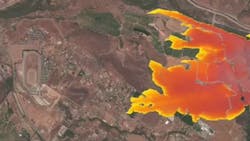SDG&E Announces Wildfire Safety, Resilience Advancements for 2021 Wildfire Season
San Diego Gas & Electric (SDG&E) recently unveiled its wildfire mitigation and resiliency advancements in preparation for this year’s wildfire season. The advancements continue a decade-long commitment to strengthening the region against a dynamic climate that has brought on unprecedented high fire-threat conditions in recent years.
Infrastructure and technological enhancements continue to play a fundamental role in limiting the potential risk of utility-related wildfires and mitigating the impacts experienced during a Public Safety Power Shutoff (PSPS). As a result of this year’s resiliency efforts like strategic undergrounding and an expanded generator grant program, SDG&E estimates that nearly 11,000 additional customers could benefit from reduced PSPS impacts, depending on the weather events experienced this year. In addition to building regional resiliency, this year’s growth in clean technology also contributes to the company’s sustainability goals.
“Nothing is more important than the continued safety and well-being of the communities we serve, as well as the preservation of our environment,” said Caroline Winn, chief executive officer for SDG&E. “We are working tirelessly to integrate new, innovative technologies to significantly decrease the PSPS impacts experienced by our customers and reduce utility-related wildfire risk, while also forging a path towards a more sustainable future.”
A wildfire risk analysis report published this year by the California Public Utilities Commission's Safety and Enforcement Division and conducted by Technosylva Inc. found that PSPS carried out by SDG&E between Oct. 10 and Nov. 1, 2019, possibly prevented utility-related wildfires which could have had the potential to affect up to 34,471 people, damage 35,112 buildings and burn approximately 327,277 acres. The analysis examined 13 damage incidents identified by SDG&E using Technosylva’s Wildfire Analyst software, which provides a real-time analysis of wildfire behavior and a model simulation of potential wildfires based on multiple factors, including local topographic characteristics, weather factors, surface fuel types and vegetation moisture.
In addition to PSPS and robust wildfire mitigation programs, advanced clean technology is a critical component of SDG&E’s resiliency efforts throughout the High Fire-Threat District (HFTD). Leading the way in this effort is a state-of-the-art flow battery that will be integrated into the Cameron Corners microgrid to keep critical facilities and customers energized during a power shutoff. The flow battery will help store clean energy produced by local solar panels to help limit emissions and build greater regional resiliency.
SDG&E is also piloting a cutting-edge mobile power station to help support the needs of customers impacted by a PSPS. The mobile power station is a unique four-wheel-drive vehicle with a 500kW set of lithium-ion batteries that will help keep critical customers energized during a power shutoff. The mobile clean-energy solution will also include charging ports for clean energy vehicles.
Additional enhancements and advancements this year include:
- Private Communications Network
A new private communications network is under development to support advanced protection systems, like falling conductor protection and high-speed relays and enable more efficient system communications.
- Enhanced Infrastructure Hardening
More than 150 miles of overhead lines are planned to be hardened in 2021. Additionally, 25 miles of lines will be strategically undergrounded to help keep communities and critical customers energized during a power shutoff.
- Virtual Reality (VR) Training
SDG&E is launching a VR training program to help field workers run through different scenarios and learn how to quickly identify and efficiently respond to issues they may encounter in the field, including addressing potential wildfire risks.
- Weather and Situational Awareness Advancements
SDG&E is updating its weather network and will become the first in the state to include cameras that measure chlorophyll in vegetation and sensors that measure moisture content in the brush. The network will also leverage satellites' latest remote sensing capabilities to detect, alert, and monitor wildfire activity from space. SDG&E also continues to use drones to evaluate the condition of our overhead electric distribution lines and equipment and other infrastructure in the highest fire-threat areas.
- Generator Program Expansion
Medical Baseline customers who experienced a Public Safety Power Shutoff in 2020 have received or are being offered a portable renewable generator for future energy needs. Customers in the areas at greatest risk for wildfire have also been offered additional generator rebates.
- Expanded Community Partnerships
SDG&E has expanded its community partnership network with 2-1-1 San Diego and 2-1-1 Orange County, the American Red Cross, and the Inter-Tribal Long Term Recovery Foundation to disseminate critical wildfire preparedness information and helpful customer resources during a PSPS.
